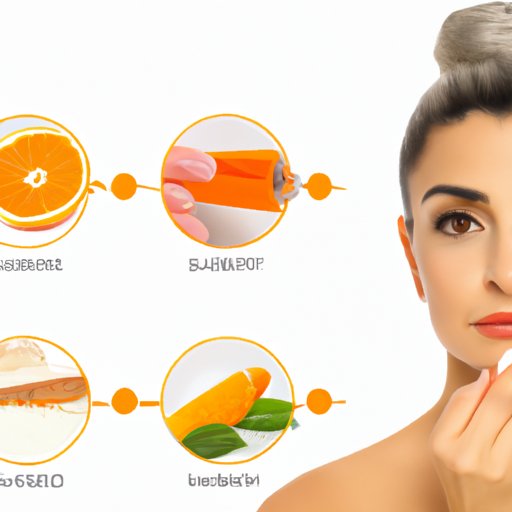
I. Introduction
As we age, our skin undergoes a variety of changes, including wrinkles, age spots, and sagging. While these changes are a natural part of the aging process, they can also be caused or exacerbated by a variety of factors, including sun damage, lifestyle habits, and, surprisingly, vitamin deficiencies. In this article, we’ll explore the connection between vitamin deficiency and sagging skin, and provide tips on how to maintain healthy, firm skin as you age.
II. The Hidden Culprit Behind Sagging Skin: Vitamin Deficiency
Vitamins are an essential component of a healthy diet, playing a critical role in everything from energy production to immune function. But when it comes to skin health, certain vitamins can be especially important. One of the most important vitamins for skin health is vitamin C, which plays a crucial role in the production of collagen and elastin, two proteins that help to keep skin firm and elastic. When you don’t get enough vitamin C, your body is less able to produce these proteins, which can lead to sagging skin and wrinkles.
But vitamin C isn’t the only nutrient that has a significant impact on skin health. Other vitamins, including vitamins A, D, E, and K, also play important roles in maintaining healthy skin. For example, vitamin A can help to regenerate skin cells, while vitamin E is a powerful antioxidant that can help to protect your skin from damage caused by free radicals.
III. The Top Vitamins You Need for Healthy, Firm Skin
If you’re looking to maintain healthy, firm skin as you age, there are a few key vitamins that you’ll want to focus on. These include:
- Vitamin C: found in citrus fruits, berries, leafy greens, and bell peppers
- Vitamin A: found in sweet potatoes, carrots, spinach, and kale
- Vitamin D: found in fatty fish, eggs, and fortified foods like milk
- Vitamin E: found in nuts, seeds, and leafy greens
While it’s always best to get your vitamins from whole foods whenever possible, supplements can also be a good option if you’re not able to get enough vitamins from your diet alone.
IV. How to Test Yourself for Vitamin Deficiencies & Improve Your Skin Health
One of the easiest ways to detect a vitamin deficiency is to undergo a blood test. Your doctor can provide you with a simple blood test that will show you whether you have any vitamin deficiencies, and can recommend dietary or lifestyle changes to help address any deficiencies that are identified.
In addition to undergoing a blood test, there are other steps you can take to improve your skin health and address vitamin deficiencies. For example, eating a diet rich in fruits, vegetables, lean protein, and healthy fats can help to provide your body with the nutrients it needs to maintain healthy skin. Similarly, taking dietary supplements can also be a good option if you’re not getting enough vitamins from your diet alone.
Finally, it’s important to maintain healthy habits that support skin health, including wearing sunscreen, avoiding smoking or excessive alcohol consumption, and getting enough sleep and exercise.
V. The Role of Nutrition in Skin Health: A Comprehensive Guide
While it’s clear that vitamins play an essential role in maintaining healthy skin, it’s worth noting that nutrition and dietary habits have a much broader impact on skin health. For example, consuming a diet that’s high in sugar and simple carbohydrates can lead to inflammation, which can exacerbate skin conditions like acne or psoriasis. Similarly, consuming too much alcohol or caffeine can dehydrate your skin, making it look dull and lifeless.
On the other hand, eating a diet that’s high in antioxidants, healthy fats, and other essential nutrients can help to improve skin health and reduce the risk of premature aging. Some key dietary tips for maintaining healthy, glowing skin include:
- Eating a variety of colorful fruits and vegetables, which are high in vitamins, antioxidants, and other essential nutrients.
- Consuming healthy fats, like omega-3 fatty acids, which can help to support skin health and reduce inflammation.
- Drinking plenty of water and staying hydrated throughout the day to support proper skin function.
VI. Sagging Skin: How Vitamin Deficiency is Related to Premature Aging
In addition to contributing to sagging skin, vitamin deficiencies can also play a role in premature aging. When your body is deficient in essential nutrients like vitamins A, C, and E, it can become less able to repair and regenerate damaged skin cells, leading to wrinkles, fine lines, and other signs of aging.
The good news is that by addressing any vitamin deficiencies and taking steps to improve your skin health, you can help to prevent premature aging and keep your skin looking youthful and vibrant for years to come.
VII. Conclusion
While sagging skin and other signs of aging are a natural part of the aging process, there are steps you can take to maintain healthy, firm skin as you age. By focusing on key vitamins and nutrients, getting enough sleep and exercise, and making healthy dietary choices, you can help to support skin health and reduce the risk of premature aging.
Remember to talk to your doctor about any concerns you have regarding your skin health, and to make healthy lifestyle choices that support overall health and well-being.





